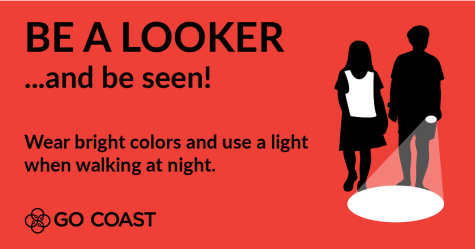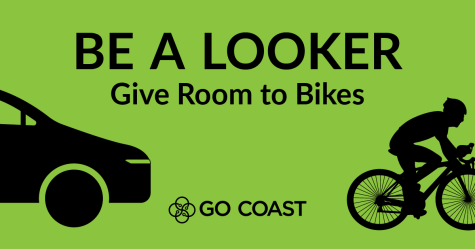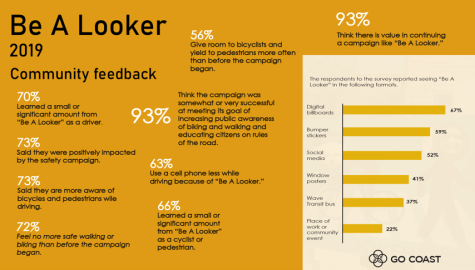Sponsored Content: Road Safety Is Everyone’s Responsibility
In the five years between 2017 and 2021, New Hanover alone saw an annual average of 65 pedestrian crashes and six deaths—and these are just the incidents that get reported. That’s more than one crash between a vehicle and a pedestrian every week, and one death every other month. The Wilmington Urban Area Metropolitan Planning Organization believes we can be doing more for everybody’s road safety.
“All of these crashes are basically preventable,” says Carolyn Caggia, WMPO’s associate transportation planner, who has been crunching the numbers on crash statistics provided by the NCDMV and DOT. “There’s a lot we can do to make this happen less.”
The WMPO is providing steps we all can take to better everybody’s road safety. The belief that we can all do better, for the sake of one another, is the driving force behind WMPO’s “Be a Looker” campaign. The “Be a Looker” webpage states, “In Brunswick, New Hanover, and Pender counties, there is an average of 90 pedestrian crashes and 59 bicycle crashes annually, according to the NCDOT. What can we do to reduce crashes? All of us—drivers, bicyclists, and pedestrians—must be vigilant and on the lookout for one another.”

The “Be a Looker” campaign promotes the fact that we are all responsible for each other’s safety through being observant of our surroundings. The campaign reminds motorists to be careful:
● Stop for pedestrians. It’s the law.
● Don’t drive distracted.
● Give bikes and pedestrians four feet of passing distance.
● Slow down!
● Look right before you turn right.
● Don’t block the crosswalk.
The campaign also places responsibility on pedestrians and cyclists to be thoughtful, predictable, and visible. For cyclists, the WMPO suggests the following:
● Be predictable.
● Ride with traffic.
● Wear a helmet and use lights.
● Don’t bike with headphones.
● Obey the rules of the road.
For pedestrians, the WMPO recommends the following:
● Cross in expected locations.
● Make eye contact with drivers.
● Don’t walk distracted.
● Make yourself visible.
● Use the built infrastructure.

The WMPO has plans for 2045: changes in infrastructure to reduce traffic-inflamed roads. While this will help, it is only one part of a necessary change. Residents cannot depend solely on infrastructure changes to solve traffic issues.
“You can’t always build your way out of traffic congestion,” Cagggia says. This is why the WMPO hosts a program, GoCoast, encouraging people to try new commuting habits.
“It’s all about getting people to use the existing infrastructure to combat traffic,” Caggia says.
A surge of people switching from single-occupant vehicles to buses, bike lanes, etc., would improve air quality and help reduce traffic in the area.
The “Be a Looker” campaign serves these people who are experimenting with new modes of transportation. It also serves the protection of tourists, an essential part of Wilmington’s economy, which is why the campaign is promoted April through September.
“That’s when people are most likely to be out walking and riding their bikes,” Caggia says. “It also covers the higher tourist season, when more people from out of town—who aren’t familiar with the roads—are going to be out on the roads.”

Community feedback from a 2019 poll shows the importance of “Be a Looker.” The poll showed that 73% of responders were positively impacted by the campaign and are now more aware of bicycles and pedestrians while driving. The majority of responders, 63%, said they use their phones less while driving because of the “Be a Looker” campaign, while 93% of responders said there is value in continuing a campaign like this.
To stay reminded of these road-safety tips, the WMPO provides a service that lets you take the pledge to Be a Looker! If you pledge, you will receive quarterly reminders of road-safety tips that will help to keep you and your community members safe. As the weather gets warmer, and people hit the streets on foot, bike, and motor vehicles, WMPO’s “Be a Looker” campaign promotes this: the strongest communities are those that look out for one another.
This article was sponsored by the Wilmington Urban Area Metropolitan Planning Organization.






